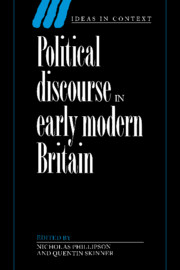Book contents
- Frontmatter
- Contents
- Contributors
- Preface
- PART I
- 1 George Buchanan and the anti-monarchomachs
- 2 The ancient constitution revisited
- 3 Arminianism: the controversy that never was
- 4 ‘Scientia civilis’ in classical rhetoric and in the early Hobbes
- PART II
- PART III
- PART IV
- PART V
- A bibliography of the writings of J. G. A. POCOCK
- Index
- Ideas in Context
2 - The ancient constitution revisited
Published online by Cambridge University Press: 07 May 2010
- Frontmatter
- Contents
- Contributors
- Preface
- PART I
- 1 George Buchanan and the anti-monarchomachs
- 2 The ancient constitution revisited
- 3 Arminianism: the controversy that never was
- 4 ‘Scientia civilis’ in classical rhetoric and in the early Hobbes
- PART II
- PART III
- PART IV
- PART V
- A bibliography of the writings of J. G. A. POCOCK
- Index
- Ideas in Context
Summary
If human history is the story of painful journeys through violent upheavals, revolutions and conquests, it must equally be the story of growth, development and stability that are achieved as well as hoped for. The historian who reveals the violence rooted in the past of his civilised audience must therefore be a disturber of the peace; while a civilisation that blinds itself to the insight of the historian must rest its peace of mind on false foundations. It is this paradox that lies at the heart of Professor Pocock's first scholarly book, The Ancient Constitution and the Feudal Law, and that makes it still a book of general interest thirty-five years after its first appearance. What emerges from Pocock's examination of seventeenth-century English historical thought is a picture of the false consciousness of the ruling elites, which left them unprepared for the turbulence of their own century yet nevertheless became the basis for the disingenuous evasions of the ruling Whig ideology of the late seventeenth and eighteenth centuries.
At the heart of this ideology was the common-law view of the past, a view expressed with paradigmatic force by Sir Edward Coke at the beginning of the century. What interested Pocock about the Cokean core of Whig thought was the degree to which Coke's view of the ‘ancient constitution’ depended on a false (but not consciously falsified) view of history. Completely absent from Coke's writings was any recognition that significant change ever confronted the common law.
- Type
- Chapter
- Information
- Political Discourse in Early Modern Britain , pp. 23 - 44Publisher: Cambridge University PressPrint publication year: 1993
- 13
- Cited by



